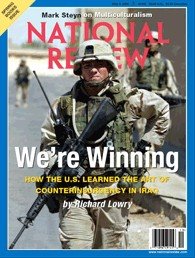More Troops?
In today's Washington Post, WilliamKristol and Rich Lowry solve all of Bush's Iraq problems: "We are at a crucial moment in Iraq. Supporters of the war, like us, have in the past differed over tactics. But at this urgent pass, there can be no doubt that we need to stop the downward slide in Iraq by securing Baghdad. There is no mystery as to what can make the crucial difference in the battle of Baghdad: American troops. A few thousand U.S. troops have already been transferred to Baghdad from elsewhere in Iraq. Where more U.S. troops have been deployed, the situation has gotten better. Those neighborhoods intensively patrolled by Americans are safer and more secure. But it is by no means clear that overall troop numbers in Baghdad are enough to do the job. And it is clear that stripping troops from other fronts risks progress elsewhere in the country. The bottom line is this: More U.S. troops in Iraq would improve our chances of winning a decisive battle at a decisive moment. This means the ability to succeed in Iraq is, to some significant degree, within our control. The president should therefore order a substantial surge in overall trooplevels in Iraq, with the additional forces focused on securing Baghdad."
Strategic questions aside,Glenn Greenwald points out that this idea is, um, a bit of a flip flop.
"You hardly qualify as a retired general these days unless you have written an op-ed piece demanding Secretary of Defense DonaldRumsfeld's resignation. One of Rummy's alleged sins was not providing enough troops to secure postwar Iraq. The debate over troop levels will rage for years; it is both characteristically American and somewhat beside the point.That's Lowry in the National Review on April 14, 2006. That's right, 2006. Not a two years ago, just five months
Obviously, if we had it to do over again, we would send more troops in the hopes that sheer numbers would head off our problems. But to think that higher troop levels would have been a magic bullet is to indulge a very American faith in the power of mass to overcomeanything. In Iraq, we have faced a delicate political and cultural problem that requires finesse above all — finesse dependent on a fine-tuned understanding of an alien society." (Bolds Mr. Greenwald's)
What garnered this quick change in direction? Could it be a need to be the polar opposite to what Democrats (and a growing number of Republicans) are proposing - a draw down in the number of troops in Iraq?
I think this idea has less to do with actually 'winning' in Iraq than it does in proving to everyone that they still believe in the mission in Iraq. Because, for them, a strong enough belief is all that's needed to be successful. After building a party image that is based almost entirely on being resolute, always sure, and always right (and opposed to Democrats who are always flip-flopping, never sure of anything, and always wrong) admitting that the center-piece of Republican foreign policy is wrong and needs to be changed brings everything that Republicans have done since 2000 into question.
If you claim that you're never wrong, then you say that you are wrong, everything you ever did is suddenly open to criticism.
The fact that Bush will not leave Iraq 'as long as he's President' has less to do with military strategy and everything to do with internal politics. Dead soldiers and civilians are just collateral damage.
Kristol and Lowry fill out the rest of their alotted word count with largely meaningless platitdues, including this gem:
"But in the current environment of sectarian bloodletting, all signs are that American troops are more trusted and more welcome thanIraqis."I have some doubts about that one. Lowry also wrote in the May 9, 2005 issue of New Republic

War in Iraq Neocons Rich Lowry Troop Levels






No comments:
Post a Comment